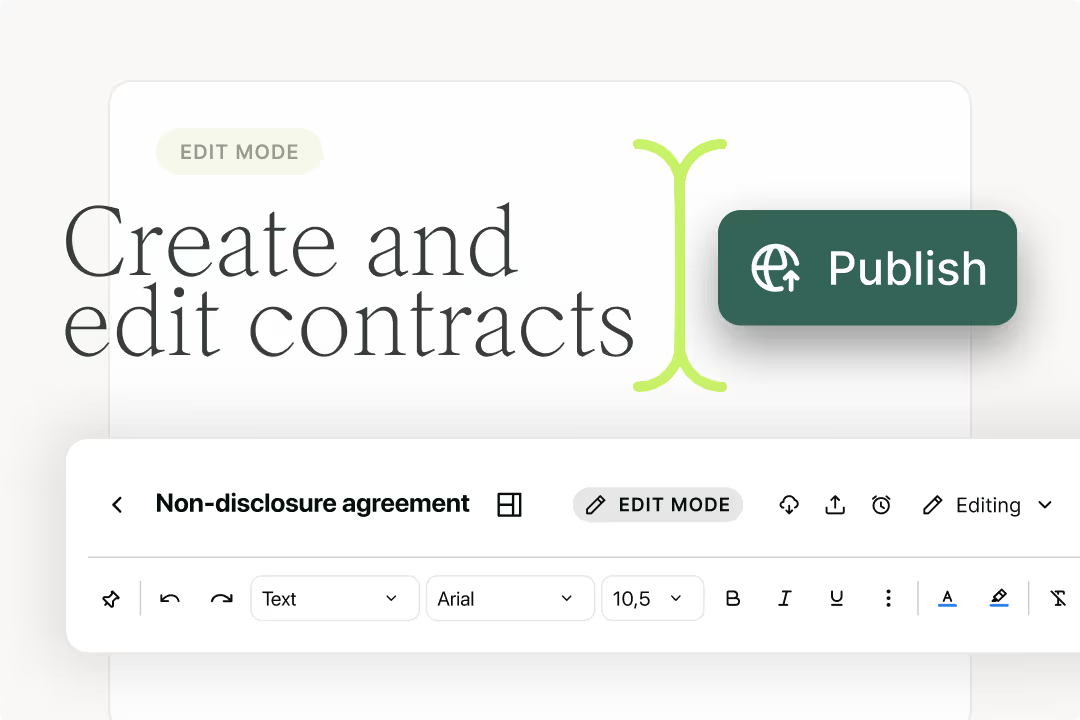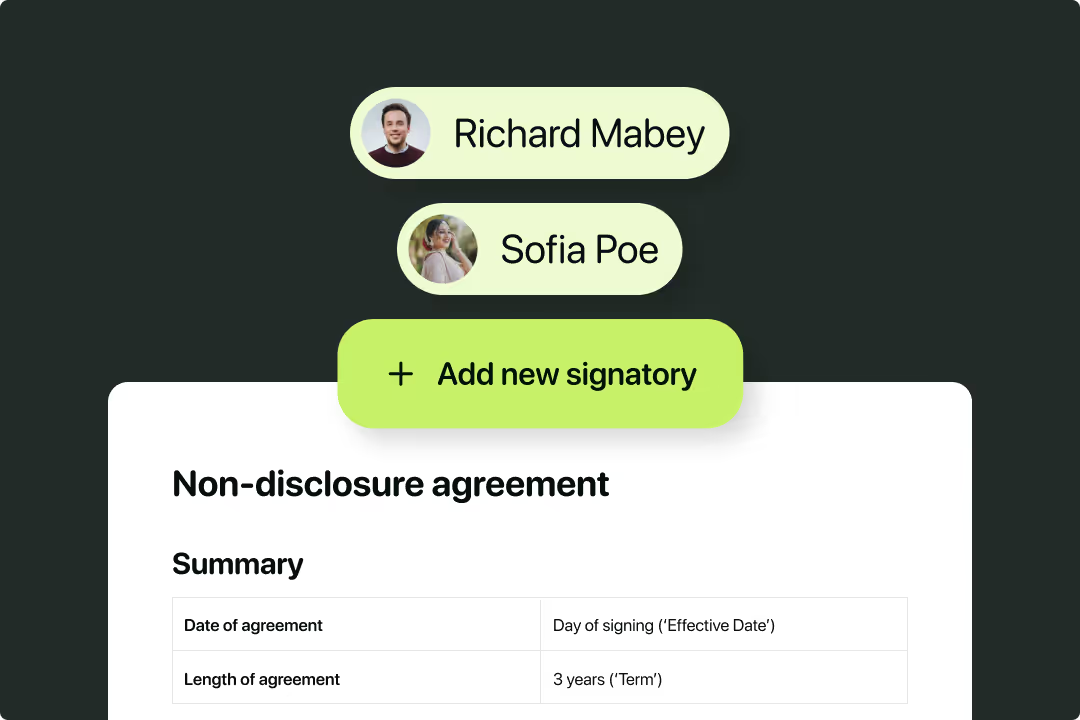Solutions
Customer Support
Resources
Managing large volumes of contracts as a scaling business is tough. Ensuring your contracts are fully compliant without letting them consume all of your time? Even tougher.
Contract compliance is a task best managed by legal professionals. But with in-house legal teams buried in low-value work, it’s often wise to make contract compliance a company-wide mission.
But what is contract compliance and why is it such a daunting task? This post explores what contract compliance involves and how fast-growth businesses can improve their contract workflow to make contract compliance far easier, including implementing a tool like Juro.
If you're ready to implement a tool that streamlines contract compliance, hit the button below. If not, keep reading to find out more.

Contract compliance describe a series of checks and procedures businesses implement to ensure that they conform with regulations and the terms they’re bound by.
It usually forms part of a broader contract management strategy, and it seeks to ensure that contracts are executed properly at all stages - including both before and after signing.
The standards of contract compliance are often determined by internal and external influences. They can be set by contract managers, industry leaders and governments, all of whom are seeking to ensure that the contract process is fair and secure for all parties, regardless of the power dynamic.
However, given the complexity of contracts and the sheer volume of contracts being processed in scaling companies, the job of contract compliance can often become unmanageable, particularly for teams with a low legal headcount.
A few of the problems commonly encountered in contract compliance workflows include:
Contract compliance is a hefty task, particularly for businesses managing high-risk and high-volume contracts.
It requires keen attention to detail and a strong understanding of regulatory requirements, so the role is typically undertaken by already busy legal teams who are experienced in the craft. This can quickly become a drain on the legal department’s time and distract them from higher-value tasks.
It can be hard to strike a balance between not consuming too much of legal’s time and ensuring that contracts are reliable. For growing businesses with limited resources, it can be difficult to create and sustain an approval procedure that works, particularly in the absence of contract automation software and against the clock.
With multiple copies of the same contract floating around, it can be difficult to track which contract is the final version and in need of review.
When you add poor communication to the equation, legal and business teams can miss important details and make costly mistakes, particularly if the wrong copy of a contract gets sent for signing or approval.
The challenges of contract compliance are only made worse by the fact the regulatory landscape is constantly changing.
Regulations are constantly being introduced, amended and overwritten, meaning those responsible for contract compliance need to keep up to date with the moving goalposts of what compliance involves.
Contract compliance is a critical element of every contract management strategy, and an effective compliance system will benefit your business in various ways.
Firstly, failing to meet compliance standards can cause your company’s reputation to be tarnished, and it can jeopardize the relationships you’ve built already.
More often than not, regulations are there to protect parties to a contract and establish trust. If your contracts miss the mark on these, it can undermine that trust altogether.
There's also the risk of losing time and money. Poor contract compliance invites fines, penalties and damages in the event of a contract breach, or a failure to comply with the law.
In short, effective contract compliance practices can eliminate multiple risks, including reputational damage, legal action and poor customer experience. That’s why it’s critical your business gets contract compliance right to begin with.

Some businesses have a designated contract manager or contract compliance officer in charge of managing and ensuring contract compliance. However, fast-growth businesses aren’t always in a position to hire for such roles, and it’s often down to legal and business teams to manage contract compliance between them instead.
Fortunately, contract management software streamlines the contracting process and makes it easier to automate contracts and set them up for success.
From setting up sequential approval workflows and baking fall-back positions into contract templates using conditional logic, contract tools like Juro empower commercial teams to manage contracts confidently, giving legal teams peace of mind.
Business teams will likely have a lot of questions when self-serving on certain contracts for the first time. That’s why it’s useful to have a comprehensive contract playbook on hand to provide direction about how to create and manage compliant contracts.
A contract playbook sets out everything from which contracts require approval to what the fallback clauses to use during negotiations. It should also outline any changes in the law or relevant regulations, as these are things most business teams won’t be keeping track of.
Contract playbooks ensure legal and business teams remain consistent in their approach to the contract lifecycle and that they are aware of the relevant regulations and rules at play.
Creating a standardized contract management process can help to eliminate uncertainty and minimize non-compliance.
By providing a range of pre-approved templates that can be used on-demand, legal teams can empower business teams to work independently on contracts with minimal risk.
With Juro’s automated contract templates, legal teams can define a Q&A flow for commercial teams to use. As they go through the Q&A workflow, their answers populate the smartfields with the correct details, eliminating inaccuracies and empty fields.
Users can also use features like conditional logic to bake certain fall-back positions into contracts, and automate certain responses to ensure contract compliance, too.

It’s also useful to host your company’s contracts in one place where they can be accessed by the relevant teams on demand.
Creating a contract repository is an effective way to gain control over your versions and ensure that the right copies of contracts are being used as precedents. It can improve company-wide contract visibility and ensure agreements are approached consistently across all departments and use cases.
They also function as effective ways to track important contract metrics and they can provide you with useful insights into how similar contracts were executed and managed previously, and where friction commonly occurs.

Approval workflows are an effective way to ensure that contracts have been reviewed and approved before being sent for signing.
These approval processes allow legal teams and other senior stakeholders to sign off on contracts without needing to be heavily involved in every stage of the contract lifecycle.
With platforms like Juro, users can establish contract approval workflows that outline the specific order that parties should approve the contract in, and notify them accordingly. This means that legal teams can rest assured that inadequate contracts won’t fall through the cracks, which can lead to non-compliance.

In fast-growth businesses, it’s common for the contract process to lack organization - particularly for start-ups that are building the legal function from the ground up.
However, it’s important to implement structure and goals early on in the contract management process, as efficient contract management means increased opportunity to improve your revenue operations.
To establish this structure, it’s useful to have a benchmark of what compliance looks like within your organization. This allows legal and commercial teams to measure their performance against specific metrics.
You should then use regular contract audits to measure compliance against these standards and identify areas for improvement or where additional measures need to be put in place.
When it’s unclear who’s responsible for what in the contract workflow, important tasks can get neglected. From a contract compliance perspective, this can prove detrimental, as small errors and omissions can undermine the security, validity and performance of a contract.
That’s why it’s important to allocate roles and responsibilities surrounding contract compliance and to prevent the lines from being blurred.
For instance, some individuals might be responsible for ensuring invoices are paid on time and that there’s no breach of contract terms. Meanwhile, other individuals might be responsible for external obligations like ensuring compliance with regulations such as the California Consumer Privacy Act and the GDPR.
Regardless of who's responsible for what, ensure that this is common knowledge and that you’ve empowered your team to take ownership of their contract compliance duties.
The scope of what contract compliance involves is ever-evolving, so it’s important to ensure that your contract compliance protocols adapt accordingly, too.
Therefore, those involved in contract compliance roles should keep a close eye on the regulatory landscape and how it’s changing. This is necessary to ensure that your contract management processes are compliant with the current rules, rather than the old ones.
Whether it’s local, state, or federal laws, legal and business teams need to be prepared for changing legal requirements within their industry. Spending the time and resources to remain aware of these developments is key to contract compliance.
It may even be worth creating a contract compliance checklist to help you monitor contract compliance throughout your organization.
A contract compliance checklist is a document or tool used internally and externally to measure how successfully a business is complying with the relevant rules, regulations, and best practices. This will help you quickly and efficiently identify compliance issues.
Below is an example of a contract compliance checklist to give you an idea of matters you might consider within a compliance audit, depending on what you're assessing.

One of the best ways to improve contract compliance is to implement a tool with features that make the job less painful for contract stakeholders.
Juro’s contract automation software offers a wide range of features that help businesses to streamline and automate their contract workflow, allowing them to close contracts faster and reduce room for error.
Read more about how businesses are using Juro to remove the risk of human error and empower non-lawyers to self-serve without compromising legal security in our customer stories.
Juro is an all-in-one contract automation platform that helps visionary legal counsel and the teams they enable to agree and manage contracts in one unified workspace.
If you’re looking for a contract platform that empowers commercial teams to self-serve on contracts without compromising legal hygiene, hit the button below to find out more.
The best way to monitor contract compliance is to implement contract management software that tracks obligations and contract data in real-time. Businesses should also monitor contract compliance periodically using contract compliance audits.
A contract compliance specialist is responsible for conducting detailed contract compliance audits and investigations. This involves tracking important metrics relating to compliance and ensuring that agreements comply with regulations, among other things.
Contract compliance can be improved in a few main ways:
Lorem ipsum dolor sit amet, consectetur adipiscing elit. Suspendisse varius enim in eros elementum tristique. Duis cursus, mi quis viverra ornare, eros dolor interdum nulla, ut commodo diam libero vitae erat. Aenean faucibus nibh et justo cursus id rutrum lorem imperdiet. Nunc ut sem vitae risus tristique posuere.

